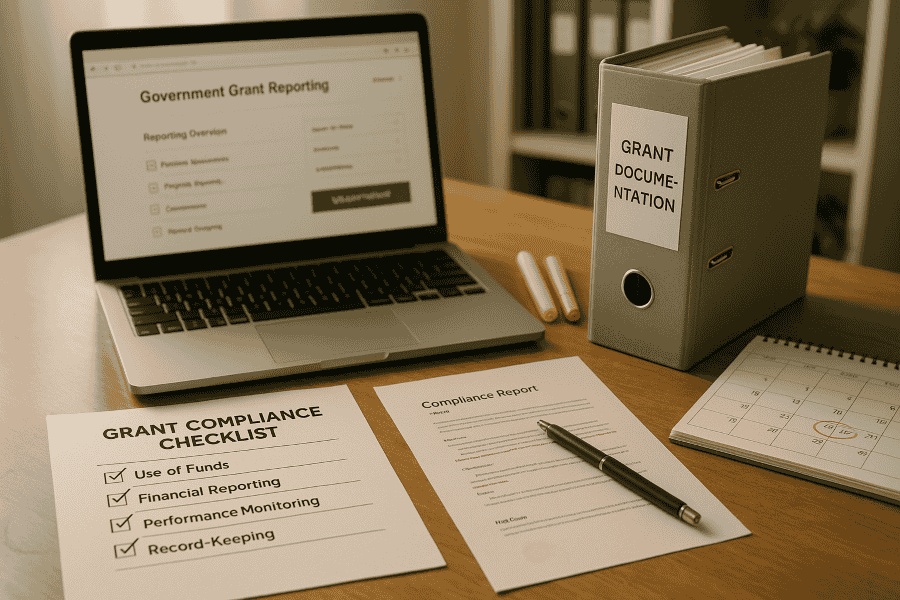Securing the grant is just the beginning—what comes next really counts. Staying compliant with a grant’s terms isn’t just about paperwork; it’s about proving you can follow through. From meeting deadlines to detailed financial reporting, sticking to the rules is what keeps the funding—and future opportunities—within reach.
Looking at how compliance fits into the broader mix of types of startup funding can also help you build smarter financial habits. Whether you're navigating grants, loans, or equity, staying organized and transparent sets a strong foundation for sustainable growth.
In this blog, we’ll break down what grant compliance actually looks like in practice—and how to stay on top of your responsibilities without getting overwhelmed.
How to Stay on Top of Grant Compliance and Accounting Rules
Landing a grant can unlock major opportunities—but it also comes with strings attached. Staying compliant isn’t just red tape; it’s what protects your startup from legal trouble and keeps future funding within reach. Grant compliance means playing by the rules that come with the money—whether it’s how you spend, report, or track it.
This becomes even more important if you’re managing federal grants over $750K. At that level, the expectations around audits, documentation, and financial reporting get serious. That’s why having clear processes in place early on isn’t just smart—it’s non-negotiable.

The Importance of Accurate Recordkeeping
Effective recordkeeping is the backbone of grant compliance. Every transaction, expense, and allocation must be meticulously documented to ensure funds are used appropriately. This includes maintaining detailed records of invoices, receipts, and contracts related to grant expenditures.
Startups should also implement systems that allow for easy tracking of grant-related activities. For example, using specialized accounting software can simplify the process of categorizing expenses and generating reports. These records not only help during audits but also provide transparency, which is vital for maintaining trust with grantors.
Timekeeping: A Critical Component
Timekeeping is another essential aspect of grant compliance. Employees working on grant-funded projects must accurately log their hours to ensure proper allocation of labor costs. This is particularly important for federal grants, where stringent rules govern how labor expenses are calculated and reimbursed.
To stay compliant, startups should establish clear policies for time tracking and use reliable tools to monitor employee hours. Regular audits of timekeeping records can help identify discrepancies early and prevent issues during formal audits.
Managing Direct vs. Indirect Costs
Understanding the distinction between direct and indirect costs is crucial for startups handling grant funds. Direct costs are expenses directly tied to the grant project, such as salaries for project staff or materials needed for research. Indirect costs, on the other hand, are general expenses like utilities or administrative support that benefit multiple projects.
Startups must allocate these costs accurately within cost pools to avoid mismanagement. Misclassification can lead to compliance violations, jeopardizing future funding opportunities.
Preparing for Audits
Audit preparation is a non-negotiable aspect of grant compliance, especially for organizations exceeding the $750K federal threshold. Audits assess whether funds were used in accordance with grant terms and federal regulations.
To prepare, startups should:
- Conduct internal reviews of financial records and compliance practices.
- Ensure all documentation is organized and accessible.
- Address any discrepancies or gaps in records before the audit begins.
Being proactive in audit preparation not only ensures compliance but also builds credibility with grantors.
The Role of a Grant Reporter
A grant reporter plays a pivotal role in managing compliance tasks. This individual is responsible for tracking expenditures, preparing reports, and ensuring adherence to grant terms. By centralizing these responsibilities, startups can streamline compliance processes and reduce the risk of errors.
Given the growing emphasis on robust compliance, startups must prioritize hiring or training a dedicated grant reporter. Highlighting this Compliance Trend underscores why startups should act early to establish strong compliance frameworks.
Compliance-Friendly Funding Options
For startups looking beyond equity deals, grants are a strong example of what is non-dilutive funding—capital that fuels growth without giving up ownership. Because they come with clear rules but no dilution, they’re often a smart choice for founders who want to scale responsibly while staying compliant
By implementing these strategies, startups can confidently manage grant compliance and accounting rules, ensuring their funding is used effectively and ethically.
Boost Your Grant Reporting Efficiency with Software Tools
Efficient grant reporting is essential for organizations to demonstrate accountability and secure future funding. This process involves documenting how funds are utilized and showcasing program outcomes in a clear, transparent manner. Specialized software tools can simplify this task, ensuring compliance with grant requirements while saving time and resources.
The Importance of Grant Reporting
Grant reporting is more than a formality—it’s a critical step in maintaining trust with funders. It provides a detailed account of how allocated funds are spent and highlights the impact of funded programs. For a deeper understanding of the fundamentals of grant reporting.
Failing to meet reporting standards can jeopardize future funding opportunities. A well-structured grant report not only fulfills compliance requirements but also strengthens your organization’s credibility.
How Software Tools Streamline Grant Reporting
Specialized software solutions are transforming the way organizations approach grant reporting. Tools like SmarterSelect and Submittable offer features such as multi-grant tracking, real-time collaboration, and detailed analytics, making it easier to compile accurate and compelling reports.
For example, SmarterSelect provides customizable templates and streamlined application management, while Submittable enables cloud-based collaboration and advanced data visualization. These platforms reduce manual errors and ensure consistency across reports.
Enhancing Reports with Visual Aids and Analytics
Clear communication is key to effective grant reporting. Incorporating visual aids such as charts, graphs, and infographics can make complex data more accessible to stakeholders. Additionally, data analytics tools help identify trends and measure program outcomes, adding depth to your reports.
Real-World Success: Structured Reporting in Action
A structured approach to grant reporting can yield impressive results. For instance, Liberate Medical utilized a phase-gate reporting system aligned with NIH requirements while developing a respiratory device. This meticulous process ensured FDA compliance and resulted in $2.1M in follow-on funding with zero audit findings.
Qubit Capital’s Expertise
Looking to secure funding for your startup? Learn how to get startup business grants to navigate the application process effectively while adhering to compliance standards.
By integrating specialized software tools and adopting best practices, organizations can transform grant reporting from a tedious task into a strategic advantage.
How Strategic Support Can Improve Your Grant Applications
Crafting a successful grant application requires more than just filling out forms—it demands a strategic approach to budgeting, personnel alignment, and financial storytelling. Startups often face challenges in creating applications that stand out, but with the right support, these hurdles can be transformed into opportunities for success.
1. Build a Detailed and Accurate Budget
A well-structured budget is the backbone of any grant application. It not only demonstrates your financial preparedness but also reassures funders of your ability to manage resources effectively. Begin by outlining all project costs, ensuring that each line item is specific and justified. For example, instead of listing “personnel costs,” break it down into roles, hours, and rates. This level of detail shows transparency and builds trust with reviewers.
Additionally, aligning your budget with the requirements outlined in the Request for Proposal (RFP) is critical. Carefully review the RFP to identify any restrictions or mandatory inclusions, such as caps on administrative costs or required matching funds. This ensures your application remains compliant and competitive.
2. Align Personnel Costs with Market Standards
Funders often scrutinize personnel costs to ensure they reflect current market rates. Overestimating or underestimating these costs can raise red flags. Research industry benchmarks for salaries and benefits to ensure your figures are realistic and justifiable. This not only strengthens your application but also positions your organization as a credible and professional entity.
Moreover, consider how your team’s expertise aligns with the project goals. Highlighting the qualifications and experience of key personnel can add weight to your proposal, demonstrating that you have the right people in place to execute the project successfully.
3. Craft a Compelling Financial Narrative
Numbers alone won’t win over funders; the story behind them matters just as much. Use your budget to tell a cohesive story about your project’s goals, impact, and sustainability. Explain how each expense contributes to achieving the desired outcomes and why the requested funding is essential.
For example, if you’re applying for a grant to develop a new product, detail how the allocated funds will cover research, development, and testing phases. This narrative approach helps reviewers see the bigger picture and understand the value of their investment.
4. Address Budget Questions in RFPs with Precision
Many RFPs include specific budget-related questions, such as how you plan to manage financial risks or ensure cost-effectiveness. Take the time to provide thorough and thoughtful answers. Avoid generic responses and instead tailor your answers to the funder’s priorities.
For instance, if the RFP emphasizes sustainability, explain how your project will continue to deliver value beyond the grant period. This could involve outlining plans for revenue generation, partnerships, or additional funding sources.
5. Analyze Financial Risks
Finally, a strategic approach to grant applications involves assessing potential financial risks. Review your budget for any areas that might raise concerns, such as overly optimistic revenue projections or insufficient contingency planning. Address these risks proactively in your application to demonstrate your preparedness and reliability.
For more insights on creating standout proposals, explore our https://qubit.capital/blog/winning-grant-applications-insider-tips-and-best-practices . This resource provides actionable advice to help you craft applications that not only meet funder expectations but also exceed them.
Strategic support in these areas can significantly enhance your chances of securing funding. By focusing on detailed budgeting, market alignment, and compelling narratives, your grant applications will stand out in a competitive landscape.
Conclusion
Mastering grant compliance, effective reporting, and robust application support requires a strategic and thorough approach. By implementing the strategies discussed, startups can avoid common compliance pitfalls, ensure transparent fund usage, and build a solid foundation for future funding opportunities. A comprehensive understanding of grant requirements, coupled with meticulous reporting practices, is essential to maintaining credibility and securing long-term success.
We encourage startups to take actionable steps based on the insights shared, refining their grant processes to align with best practices. Whether it's improving documentation, streamlining reporting, or enhancing application quality, every effort contributes to a stronger grant strategy.
If you're ready to elevate your grant strategy with a compelling presentation, we at Qubit Capital can help with our Pitch Deck Creation service. Contact us to learn more.
Key Takeaways
Clear steps for achieving grant compliance are vital to avoid legal and financial pitfalls.
Effective timekeeping, cost pool management, and audit preparation are crucial, especially for federal grants over $750K.
Specialized software solutions streamline grant reporting, ensuring transparency and clarity.
A well-crafted financial narrative and budget can significantly boost grant application success.
Leveraging expert support, such as Qubit Capital’s services, can enhance your startup’s funding strategy.
Frequently asked Questions
What is grant compliance and reporting?
Grant compliance and reporting involve adhering to specific regulations, policies, and funding guidelines set by grant providers. These processes ensure that funds are used appropriately and that detailed reports are submitted to showcase how the funds were utilized and the outcomes achieved.


 Back
Back



